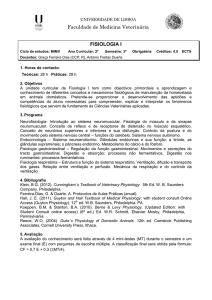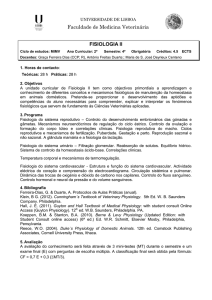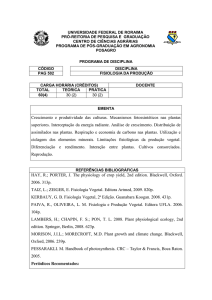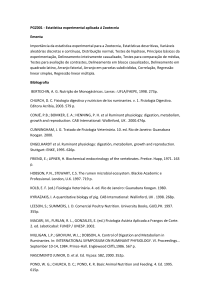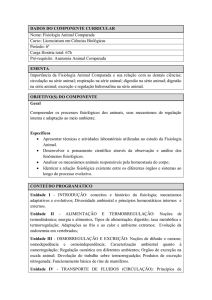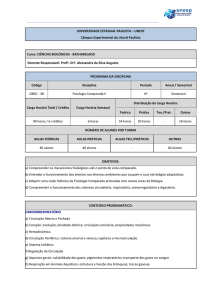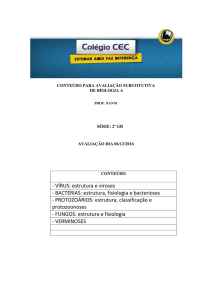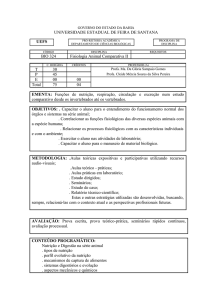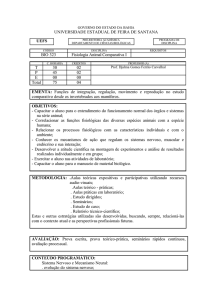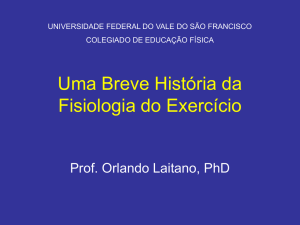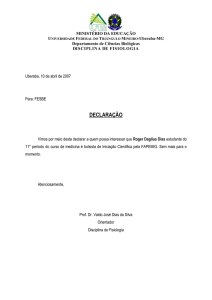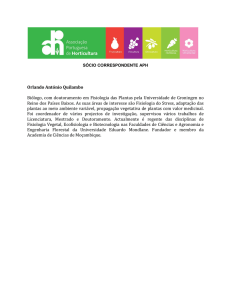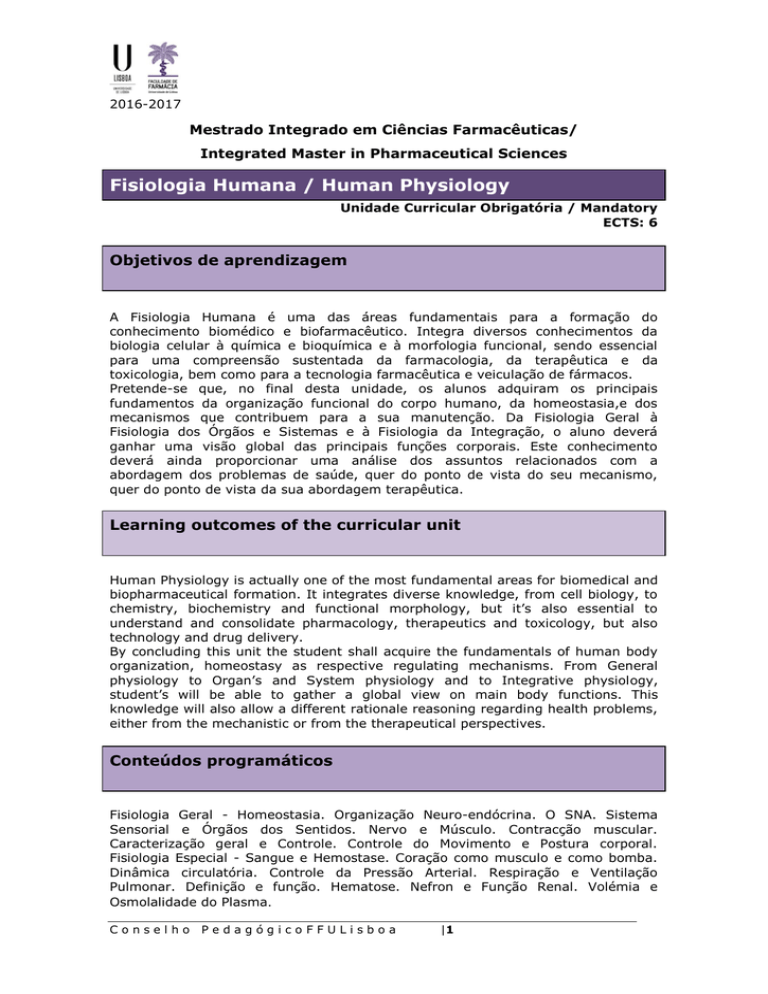
2016-2017
Mestrado Integrado em Ciências Farmacêuticas/
Integrated Master in Pharmaceutical Sciences
Fisiologia Humana / Human Physiology
Unidade Curricular Obrigatória / Mandatory
ECTS: 6
Objetivos de aprendizagem
A Fisiologia Humana é uma das áreas fundamentais para a formação do
conhecimento biomédico e biofarmacêutico. Integra diversos conhecimentos da
biologia celular à química e bioquímica e à morfologia funcional, sendo essencial
para uma compreensão sustentada da farmacologia, da terapêutica e da
toxicologia, bem como para a tecnologia farmacêutica e veiculação de fármacos.
Pretende-se que, no final desta unidade, os alunos adquiram os principais
fundamentos da organização funcional do corpo humano, da homeostasia,e dos
mecanismos que contribuem para a sua manutenção. Da Fisiologia Geral à
Fisiologia dos Órgãos e Sistemas e à Fisiologia da Integração, o aluno deverá
ganhar uma visão global das principais funções corporais. Este conhecimento
deverá ainda proporcionar uma análise dos assuntos relacionados com a
abordagem dos problemas de saúde, quer do ponto de vista do seu mecanismo,
quer do ponto de vista da sua abordagem terapêutica.
Learning outcomes of the curricular unit
Human Physiology is actually one of the most fundamental areas for biomedical and
biopharmaceutical formation. It integrates diverse knowledge, from cell biology, to
chemistry, biochemistry and functional morphology, but it’s also essential to
understand and consolidate pharmacology, therapeutics and toxicology, but also
technology and drug delivery.
By concluding this unit the student shall acquire the fundamentals of human body
organization, homeostasy as respective regulating mechanisms. From General
physiology to Organ’s and System physiology and to Integrative physiology,
student’s will be able to gather a global view on main body functions. This
knowledge will also allow a different rationale reasoning regarding health problems,
either from the mechanistic or from the therapeutical perspectives.
Conteúdos programáticos
Fisiologia Geral - Homeostasia. Organização Neuro-endócrina. O SNA. Sistema
Sensorial e Órgãos dos Sentidos. Nervo e Músculo. Contracção muscular.
Caracterização geral e Controle. Controle do Movimento e Postura corporal.
Fisiologia Especial - Sangue e Hemostase. Coração como musculo e como bomba.
Dinâmica circulatória. Controle da Pressão Arterial. Respiração e Ventilação
Pulmonar. Definição e função. Hematose. Nefron e Função Renal. Volémia e
Osmolalidade do Plasma.
Conselho
PedagógicoFFULisboa
|1
2016-2017
Mestrado Integrado em Ciências Farmacêuticas/
Integrated Master in Pharmaceutical Sciences
Fisiologia Humana / Human Physiology
Equilíbrio Ácido – Base. A micção. Digestão e Absorção dos Alimentos. Períodos
Absortivo e Post-absortivo. Fígado e vesicula biliar. Fisiologia Integrada - Ritmos
biológicos. A fisiologia das emoções, aprendizagem, memória e fenómenos
relacionados. Regulação do Metabolismo, Fome sede e saciedade. Crescimento e
Maturação sexual. Função reprodutora. Homeotermia e Temperatura Corporal A
Resistência ao Stress. Fisiologia do exercício. Envelhecimento. A “barreira” cutânea
Syllabus
General Physiology – Homeostasy. Neural endocrine organization. The ANS.
Sensorial system and the Senses. Nerve and Muscle. Muscular contraction. General
features and control. Movement and body posture. Special Physiology – Blood and
hemostasis. The Heart as a muscle and as a pump. Circulatory dynamics. Blood
pressure control. Respiration and pulmonary Ventilation. Hematosis. Nefron and
renal function. Volemia and plasma osmolarity. The acid-base balance. Miction.
Digestion and nutrient absorption. Absortive and post-absortive periods. Liver and
gallblader. Integrative Physiology. Biological rhytms. The physiological basis of
emotions. Learning, memory and related phenomena. Metabolism regulation.
Hunger, thirst and saciety. Growth and Sexual Maturation. Human reproduction
Regulation of body temperature. Resistance to Stress. Exercise physiology. Aging.
The skin “barrier”.
Metodologia Ensino/Avaliação
A unidade é basicamente suportada pelas aulas teóricas, tutoriais (39h total), que
cobrem a totalidade dos conteúdos previstos no programa semestral. Estas aulas, e
em especial durante a componente integrativa, incluem frequentemente
especialistas de diversas àreas convidados a participar com as suas competências,
no ensino. O laboratório de fisiologia (19,5h total) complementa o ensino,
proporcionando um ambiente onde os principais temas da fisiologia humana podem
ser detalhados, através de metodologias de ensino/aprendizagem complementares
(software de simulação, aprendizagem por problemas, medições biométricas
realizadas in vivo) gerando exercícios destinados a olhar mais profundamente para
alguns dos temas mais importantes do programa. Este componente activo do
ensino inclui ainda um livro tutorial (sebenta) elaborado pelo corpo docente e
distribuído gratuitamente no início do ano, acompanhando todas as aulas incluídas
no programa.
Conselho
PedagógicoFFULisboa
|2
2016-2017
Mestrado Integrado em Ciências Farmacêuticas/
Integrated Master in Pharmaceutical Sciences
Fisiologia Humana / Human Physiology
Teaching methodologies
The course is basically supported by tutorial classes (39h total) which completely
covers the course contents within a structured outline. These classes, in particular
during the integrative physiology component, often include invited speakers that
offer its own expertise within the course duration. The physiology lab (19,5h total)
complements teaching providing an environment where major issues in human
physiology might be detailed through complementary teaching/learning
methodologies (simulation software, problem-based learning, in vivo biometrical
measurements) through exercises designed to further understand and clarify some
of the most important chapters in the program. This component of active learning
also involves a tutorial book gathering all the preview classes, freely distributed to
the students in the beginning of the course.
Bibliografia principal/Bibliography
- VANDER, Arthur, et al Vander’s Human physiology: the mechanisms of body
function, 13th ed., Boston, McGraw-Hill, 2014, ISBN 978 1 259 08082 1 (disponivel
em português)
- Ganong’s Medical Physiology, A system’s Approach LangeMcG Hill Eds., 2011 ISBN
978-1-25900962-4 (disponivel em português)
- GUYTON, Arthur C., et al. Textbook of medical physiology, 10th ed, Philadelphia,
W.B. Saunders Company, 2000, ISBN 0-7216-8677-X
- BERNE, Robert M., et al, Principles of physiology, 3rd ed., St. Louis, Mosby, 2000,
ISBN 0-323-00813-5
- TRESGUERRES, Jesús, et al. Fisiologia humana, 3 ed., Madrid, McGraw-Hill
Interam Eds, 2005, ISBN 84-486-0647-7
Conselho
PedagógicoFFULisboa
|3

